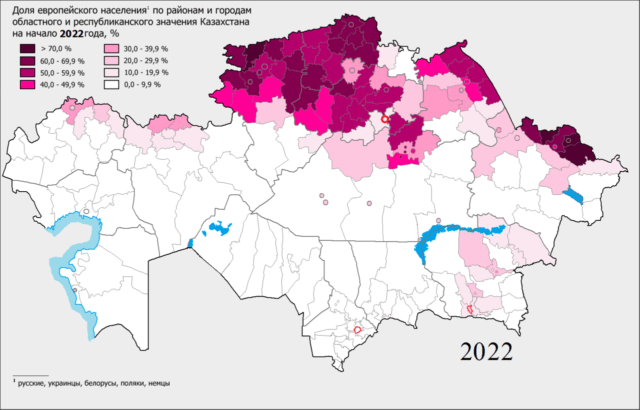Might Kazakhstan face internal separatism and ethnic problems?

Author: Giuliano Bifolchi
Recent propaganda on Telegram spread by a ‘foreign agent’ who promoted separatism in Kazakhstan highlighted possible future problems that the Central Asian republic might face since different ethnic minorities live in the country.
The General Prosecutor’s Office of the Republic of Kazakhstan is investigating a call for the alienation of one of the regions of Kazakhstan in favour of another country which, according to local sources and social media, should be the Russian Federation. According to Serik Adilkenuly, a spokesman for the Prosecutor General’s Office.
“In one of the anonymous Telegram channels, provocative material was posted, which contains a call for the alienation of one region of Kazakhstan in favour of another country. The author of the material has been identified. This person is not among the foreigners who arrived in Kazakhstan but lives and is currently in one of the non-CIS countries”.
The prosecutor’s office stated that this was a planned and purposeful action to destabilise the situation in Kazakhstan, disseminate deliberately false information and incite ethnic hatred.
According to Serik Adilkenuly, the suspect’s actions entail criminal liability and punishment under Article 174 – “Inciting social, national, tribal, racial, class or religious hatred”, Article 180 – “Separatist activity”, and Article 274 – “Dissemination of knowingly false information.”
The authorities invited the Kazakh people not to succumb to provocations. In addition, security officials stressed that their authors and distributors would be criminally liable when posting such materials and appeals (Informburo).
According to KazTag, on September 30th, 2022, a local source confirmed that the Akmola Department of the National Security Committee (DKNB) opened a criminal case on the fact of separatism. Earlier, a video appeared on social networks in which a man, allegedly from the village of Shortandy, Akmola region, admitted that he was ready to become a “collaborator” and stated that the northern regions of Kazakhstan should belong to Russia. The recording became viral in the Kazakh segment of the Internet. A new video later surfaced in which the same man apologised for his remarks.
Why does it matter?
Kazakhstan is a multi-ethnic Central Asian republic. According to different sources, representatives of 130 nationalities live in Kazakhstan and the country host more than 100 ethnic groups. Kazakhs make up the largest part of the population (65%). The Russian are the second-largest ethnic group in the country (21%), followed by Uzbek (3%), Ukrainians (2%), Uighur (1%), Tatar (1%) and German (1%).
A 7,644-kilometre international border separates the Republic of Kazakhstan and the Russian Federation. This international border is the longest in the world and the second longest by total length, after the Canada–United States border. The border starts in the West at the Caspian Sea and arrives in a west-east direction to the tripoint with China. Atyrau Region, West Kazakhstan Region, Aktobe Region, Kostanay Region, North Kazakhstan Region, Pavlodar Region, and East Kazakhstan Region lie on the border with Russian Federation.
Since 2022, Kazakh central leadership has faced domestic problems such as January manifestations and protests related to rising energy prices. Kazakh President Kassym-Zhomart Tokayev asked the military support from the Collective Security Treaty Organisation (CSTO) to face internal protest, which, according to Kazakh local security forces, included ‘foreign agents and external terrorists’ aimed to destabilise the country.
Since its independence, the presence of ethnic Russians in Kazakhstan has represented a possible threat, particularly after Russian President Vladimir Putin declared that the Kremlin has the right and the obligation to protect Russians everywhere in the world. Since the 2014 Crimea annexation to the Russian Federation, particularly after the Donbas referendum, which resulted in the annexation of Donetsk, Lugansk, Kherson and Zaporizhye regions in the Russian Federation, Astana has become worried that Moscow might use the same strategy to erode Kazakh sovereign territory.
Indeed, if the local ethnic Russians will organise protests against the central Government demanding their separation because of Kazakh domestic policy aimed at promoting nationalism and cultural identity, the Central Asian republic might live the same situation that happened in 2014 in Ukraine. Therefore, videos and social media messages advocating separatism in favour of the Russian Federation might seriously threaten the Kazakh integrity and stability.
Since the recent Kazakh-Russian relations have become ambiguous due to Astana’s reluctance to support the Kremlin in the Ukraine conflict and the confrontation with the West completely, dissatisfaction among the ethnic Russians in Kazakhstan (fuelled by Russian foreign agents) could become the starting point for a series of protests and agitation against the central Government animated by the demand for self-determination and protection of Russian nationality, language and culture.
The upcoming presidential elections in November 2022 should confirm Tokayev’s leadership until 2029, thanks to the recent constitutional changes approved by June 2022 referendum. In this context, Kazakh President should be able to balance the country between Russia, China, and the West avoiding internal disappointment that could be ridden by external actors wishing to cause instability in Kazakhstan by exploiting the different ethnic minorities present in the country, first of all, the Russian one.
Kazakh authorities reported that the person who spread misinformation and advocated for separatism in Kazakhstan in favour of the Russian Federation was a resident outside the Commonwealth of Independent States (CIS). Therefore, they might suggest that attempts to destabilise Kazakhstan might also come from regional and international actors interested in Moscow-Astana relations, which currently seem to be experiencing difficulties.
